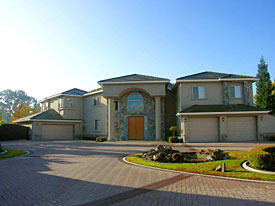Noelle Knox
USA Today

The most expensive Mort Rothbard, president of In-Shape Health Clubs, is selling this two-story home built in 2000. Price: $2.4 million Bedrooms: 4 Bathrooms: 4½ baths Size: 5,677 square feet Features: Kitchen has granite counters, stainless-steel appliances, island, ceiling fan; hardwood floors; swimming pool; four-car garage. By Frank Troglione

Median-price home This house, built in 1997, is on the market. Price: $314,500 Bedrooms: 4 Bathrooms: 2 Size: 1,622 square feet Features: Eat-in kitchen, fireplace, walk-in closet, fenced backyard, three-car garage. By Tunde Peron
For evidence of what is spooking Wall Street and wreaking havoc on the mortgage industry, one need only look at the housing market in Stockton, Calif., 40 miles south of Sacramento.
During the real estate boom, Stockton was a hotbed of speculation, bidding wars, and rocketing prices. Now, foreclosures are soaring, sales are plummeting, and there is more than a year’s supply of homes and condos on the market.
The housing market “is still sliding,” said Larry Underhill, president of the Lodi Association of Realtors, which covers Stockton. “The buzz is there is just a ton of foreclosures, and banks are going to own a lot more property before it’s over.”
Lenders filed 1,129 notices of default against borrowers who were behind on their mortgages in the second quarter, according to DataQuick Information Systems, up 205% from the second quarter last year.
The bulk of the foreclosures, Underhill said, are homes purchased with subprime, adjustable-rate mortgages or exotic loans that allowed the buyer to pay only the interest, or less, for a set period of time. As their monthly payments reset to higher rates, some homeowners and investors are finding they can’t afford them and can’t refinance — either because the property is worth less than they owe, or the mortgage they hoped to get no longer exists in today’s risk-averse market.
While economic growth in Stockton, heavily dependent on agriculture, will help turn this market around, the credit squeeze on Wall Street is making it harder for buyers to qualify for a loan.
Underhill says he’s seeing homes go under contract two or three times, and each time, the deal falls apart because “buyers can’t qualify, or buyers are understandably cautious. They see property values sliding and are saying, ‘Why am I doing this?’ “

